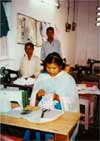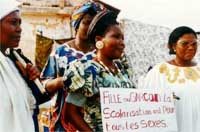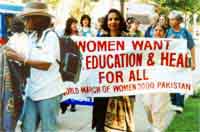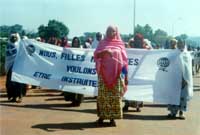April 2002 - Eliminate Poverty in All Stages of Life
 |
|
Life-long learning"In the past we were thought of as motionless women chained forever more to the confines of home, stooped over a cooking pot, the oven or a tub, bent over the baby to be changed or carrying it on our backs. We also crawled along furrows, tearing out weeds, slaving day in day out to meet the needs of our families, caught in the vicious circle of motherhood. At last schooling arrived and broadened our scope. Tiny steps, one by one, and then lengthening strides, to college, to university we run, we fly, and we will avenge everything denied us." This poetic passage, from the introduction to the Tunisian women's set of demands of October 2000, should not bring a smile to anyone's lips. Lamentably, the figures speak for themselves. Women, particularly in the Third World, are less educated than men. They go to school less often and for a shorter time. |

Accessing occupational training to improve women's living standard (India). |
|
|
Implementing this demand requires financial means, which could be generated through debt cancellation in the poorest countries. Specifically, some countries (Chad, Mexico) advocated using these means to grant scholarships to girls wishing to continue their studies. African women meeting in Ouagadougou in April 2000 asserted that what was needed was "a policy of affirmative action until the year 2005."
For adult women, the demand often revolved around organizing or continuing literacy campaigns (Bolivia, Burkina Faso, Cameroon, the Central African Republic, Honduras, Morocco, Senegal). "An uneducated woman is someone who is negligible, who is poor," a Senegalese woman remarked during the march in New York. Another marcher, from Nepal, explained, "In my country, 75% of women are illiterate; they can't read or write at all, they can't even sign their name. So what we must do first is to gain equal access in the field of education and basic health care."
"Education should foster self-esteem and self-confidence in girls," the Chilean and Peruvian women wrote. The Brazilian, Senegalese, Ukrainian and Yugoslavian women, to mention only a few, believe that it is the Department of Education's responsibility to ensure that teaching is non-sexist and encourages respect for others and tolerance. Many other countries made similar demands. Honduran, Belgian and Ghanaian women argued in essence that gender analysis was not taken into account in educational policy, and women and men teachers' awareness of it should be raised. A number of groups demanded the right of cultural minorities to be educated in their own language: Kurdish women, Native women from Ecuador and Mexico, and Kanaks, from New Caledonia. In the case of immigrant and refugee women, Cape Verde, France, Québec, and Tunisia demanded that training in the host country's language be made more accessible along with occupational training. Moroccan women wanted to see "schools closer to neighbourhoods, expansion of the road network, lighting and schools in the countryside." Since they are busy helping their mothers at home, young girls often don't have time to go to school; they can't be away from home for long periods of time, and they can't travel long distances by themselves. |
|
|
Copyrights
:
CC by-nc-sa 2.0
Last modified 2006-03-23 03:09 PM This item is available in Français, English, Español |






